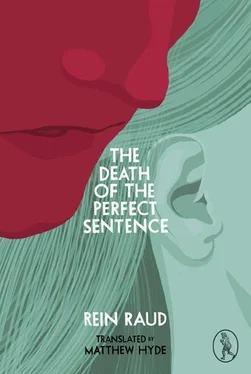But Karl was thinking about something else altogether. How could they have messed up so badly? Up until today he was certain that everything had been going just fine. He and the lads would talk about the spots of bother they got into almost as if they were boasting: who had a black Volga parked outside their window for hours on end with two dour-faced men sitting inside it smoking, who had been taken aside for crossing on a red light and instead of completing a normal statement had to spend several hours sitting in the cop shop on Lubja Street, just so that he knew that they could do whatever they wanted with him, whenever they wanted, any which way they wanted. But nothing like this had happened before. He didn’t visit the cellar any more, just in case it was being watched. But he lived in the same block as Tarts’s grandmother, and he met the rest of them at her place. And it simply wasn’t conceivable that Tarts’s grandmother’s flat was bugged. It would be hard to find a more harmless old woman. And Tarts only went to sleep there when his mother had drunk herself senseless with her latest lover, but that didn’t happen very often.
Karl knew very well that he was no hero. But in the bottom of his heart he didn’t want to admit to himself that those so-called dangerous assignments, which were supposed to put him to the test, actually involved no real danger. Until this moment.
“Do you actually know what was in the envelope?” Särg asked.
“What envelope?” Karl asked back.
At that moment the door opened and a woman slightly over thirty entered. She had a dark complexion, but light blue eyes, and coal-black hair which curled coquettishly upwards just before reaching her shoulders.
“Here are those typed-up statements which you asked for,” she said in Russian.
There was no doubt at all – she knew that she was very beautiful.
Her name was Lidia Petrovna Gromova.
Remember her.
Other people had names like Volli, Yevgeny and Anton, or Galina, Maarika and Lembe but Särg himself had always been simply Särg.
Actually his parents had given him the fairly uncommon name Helmut, which the teachers and children at kindergarten used for a while, but things changed from his very first day at school. It just so happened that there was another Helmut in his class, and as fate would have it this Helmut was one of those uncommon boys who were both sporty and bright, the kind who had the whole school hanging on their every word. And so he soon asserted his monopoly over that first name.
What’s more, Särg was easy to say. And there were no other children whose names meant a type of fish. [1] Translator’s note: Särg means “roach” in Estonian.
From an early age Särg had learned to weigh up risks and opportunities rationally and as they arose, so he did not take offence. Only his mother continued to call him Helmut, which at first was touching, but then became simply strange (his father preferred a simpler form of address: “boy, damn it”). Once he’d started at the university’s law department he introduced himself to everyone using his short surname and a similarly brisk handshake.
Grandad
Some time I would like to write about my grandfather at greater length, but now is not the time. I don’t mean the one who wrote poetry, got into trouble repaying his bank loan, and departed with the Russians during the war. I mean the other one, who never lived to see me, who trained to become a field nurse under tsarism, travelled by train to Manchuria on a humanitarian mission to fight the plague, and was then steward on an armoured train during the War of Independence (it wasn’t that trains were an obsession of his, in case you got that impression). So then, that particular grandfather apparently once said that he never read storybooks, because he could think up anything which he might find in them for himself. So he only ever wanted to read about real things.
Let’s leave aside the question of whether it is possible to write about real things, or whether everything is to some extent imagined. Of course it is, but there is still a difference, as I’m sure you will appreciate.
Clearly I don’t agree with him on the subject of storybooks, otherwise I wouldn’t write them myself. But it is still worth asking: is there actually any sense in inventing security service officials and dissidents, and even making them a little different to how they really were? After all, there are still plenty of real people around who lived through all of that stuff themselves; why not just listen to them instead? I don’t have much to say in my defence, other than that I am doing the best I can.
By that time his lank hair had started to show the first signs of thinning down the middle, and the lenses in his black-rimmed glasses were thicker than the maximum permitted for military service, which meant he was allowed to resit the university entrance exams when he failed them at the first attempt. He spent the intervening time doing lowpaid work in the district Komsomol Committee; it would look good on his CV, even if it had no ideological content. Indeed, it achieved the desired effect: even though he himself evaluated his performance as weaker, since he’d forgotten some things over the course of the year, his exam results turned out better the second time round. Over the years he’d come to be grateful that people tended not to notice his presence, which meant he could observe them from a distance, and he eventually became something of an expert judge of character. It was just a shame that he didn’t know how to turn that skill to any practical use.
To start with, that is. Once assigned to the role of investigator at the Procurator’s Office, he soon discovered he was far better at squeezing information from suspects during interrogations than any of his colleagues. What was more, the suspects themselves were often completely unaware he was doing so. And so he soon found himself being entrusted with more and more important cases. He was particularly useful in situations where quick calculations were needed, since he had a natural way with numbers. But he found that tracking down larger-scale financial machinations left him completely cold. It was as if these sums came from another world, qualitatively different from the smooth, fresh notes which the cashier handed him through the small window in the thick blue wall on payday, after he’d waited ages in the queue to sign his name. More important than the numbers themselves was the ingenuity of the riddle and the joy he experienced at finding a neat solution which left no threads hanging. But he could only remember feeling a deep sense of satisfaction from his work on one occasion. That was when he succeeded in putting his former classmate behind bars for a long stretch. It was that damned other Helmut, who was now a petrol station manager and an embezzler of state resources on a major scale. Again, it was down to Särg that Helmut decided to cooperate with the investigation – and he was wise to do so since back in those days he could’ve faced the death sentence for what he’d done.
That case didn’t go unnoticed up above. One day two men in plain clothes came to Särg’s office, introducing themselves only once they’d locked the door behind them. Half an hour had passed before they opened it again, furnished with Särg’s agreement to swap his current role for a new position which would be more challenging, where he would be properly valued for his contribution. It was not often that someone in the legal system was prepared to deal so cold-bloodedly with a childhood friend. Or rather with his namesake.
The change of job came at exactly the right time for Särg. He’d been a family man for several years now, but recently he’d noticed certain signs of restlessness from his wife. There were still no real grounds to worry, but with his innate common sense and powers of empathy, Särg knew that he had to do something.
Читать дальше












